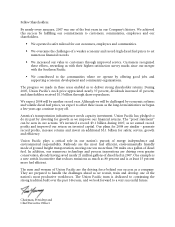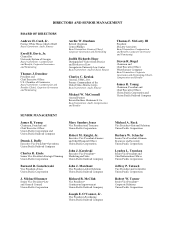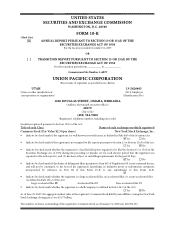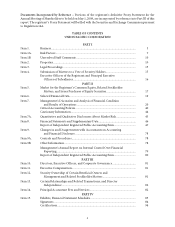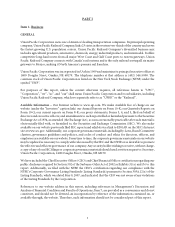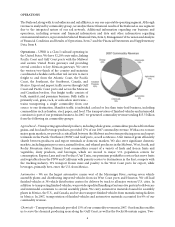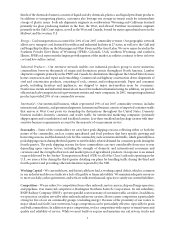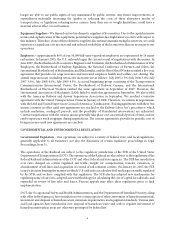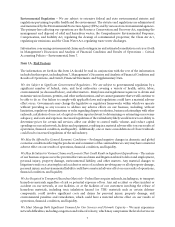Union Pacific 2007 Annual Report Download - page 12
Download and view the complete annual report
Please find page 12 of the 2007 Union Pacific annual report below. You can navigate through the pages in the report by either clicking on the pages listed below, or by using the keyword search tool below to find specific information within the annual report.8
provide to our customers. This level of demand may compound the impact of weather and weather-related
events on our operations and velocity. Although we continue to improve our transportation plan, add
capacity, and improve operations at our yards and other facilities, we cannot be sure that these measures will
fully or adequately address any service shortcomings. We may experience other difficulties related to network
capacity, dramatic and unplanned increases or decreases of demand for rail service with respect to one or
more of our commodity groups, or other events that could have a negative impact on our operational
efficiency, any of which could have a material adverse effect on our results of operations, financial condition,
and liquidity.
Severe Weather Could Result in Significant Business Interruptions and Expenditures – Severe weather conditions,
events, and other natural phenomena, including earthquakes, hurricanes, fires, floods, mudslides or landslides,
extreme temperatures, and significant precipitation may cause business interruptions, including line outages
on our rail network that can adversely affect our entire rail network and result in increased costs, increased
liabilities, and decreased revenue, which could have a material adverse effect on our results of operations,
financial condition, and liquidity.
Strikes or Work Stoppages Could Adversely Affect Our Operations as the Majority of Our Employees Belong to
Labor Unions and Labor Agreements – We are a party to collective bargaining agreements with various labor
unions. Disputes with regard to the terms of these agreements or our potential inability to negotiate acceptable
contracts with these unions could result in, among other things, strikes, work stoppages, or other slowdowns
by the affected workers. If unionized workers were to engage in a strike, work stoppage, or other slowdown, or
other employees were to become unionized, we could experience a significant disruption of our operations or
higher ongoing labor costs, either of which could have a material adverse effect on our results of operations,
financial condition, and liquidity. Additionally, future national labor agreements, or renegotiation of labor
agreements or provisions of labor agreements, could compromise our service reliability and significantly
increase our costs for healthcare, wages, and other benefits, which could have a material adverse impact on our
results of operations, financial condition, and liquidity.
The Availability of Qualified Personnel Could Adversely Affect Our Operations – Changes in demographics,
training requirements, and the availability of qualified personnel could negatively affect our ability to meet
demand for rail service. Unpredictable increases in demand for rail services and a lack of network fluidity may
exacerbate such risks, which could have a negative impact on our operational efficiency and otherwise have a
material adverse effect on our results of operations, financial condition, and liquidity.
We Rely on Technology and Technology Improvements in Our Business Operations – We rely on information
technology in all aspects of our business. If we do not have sufficient capital to acquire new technology or if we
are unable to implement new technology, we may suffer a competitive disadvantage within the rail industry
and with companies providing other modes of transportation service, which could have a material adverse
effect on our results of operations, financial condition, and liquidity. Additionally, if we experience significant
disruption or failure of one or more of our information technology systems, including computer hardware,
software, and communications equipment, we could experience a service interruption, safety failure, security
breach, or other operational difficulties, which could have a material adverse impact on our results of
operations, financial condition, and liquidity.
We Are Subject to Significant Environmental Laws and Regulations – Our operations are subject to extensive
federal, state, and local environmental laws and regulations concerning, among other things, emissions to the
air; discharges to waters; handling, storage, transportation, and disposal of waste and other materials; and
hazardous material or petroleum releases. We generate and transport hazardous and non-hazardous waste in
our operations, and we did so in our former operations. Environmental liability can extend to previously
owned or operated properties, leased properties, and properties owned by third parties, as well as to properties
we currently own. Environmental liabilities have arisen and may also arise from claims asserted by adjacent
landowners or other third parties in toxic tort litigation. We have been and may be subject to allegations or
findings that we have violated, or are strictly liable under, these laws or regulations. We could incur significant
costs as a result of any of the foregoing, and we may be required to incur significant expenses to investigate



